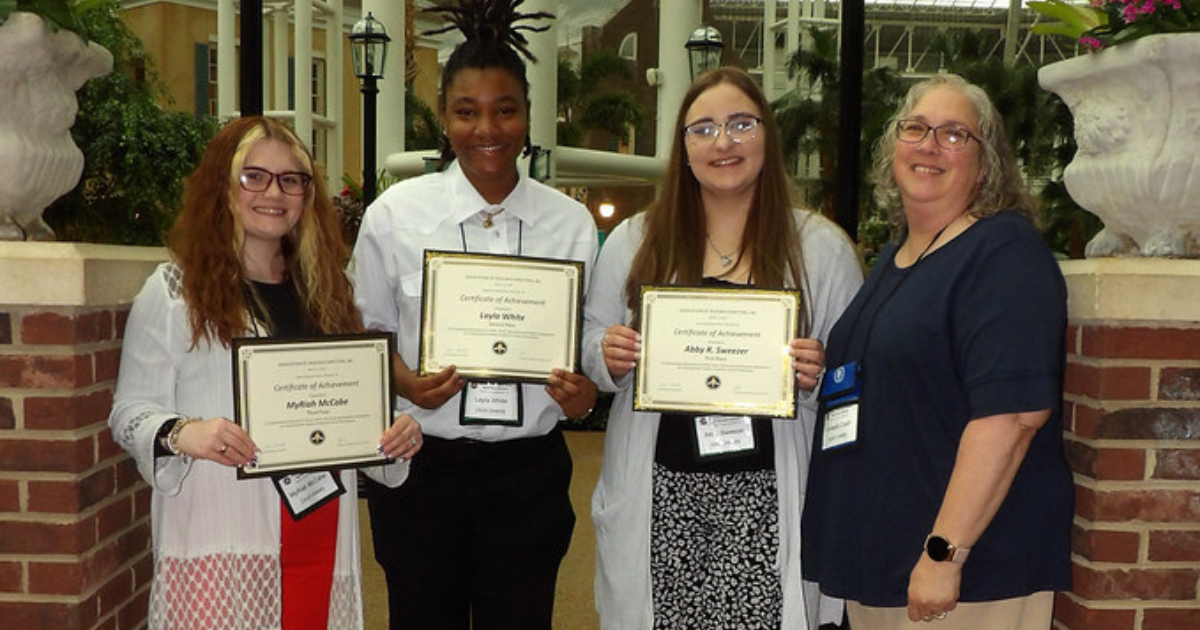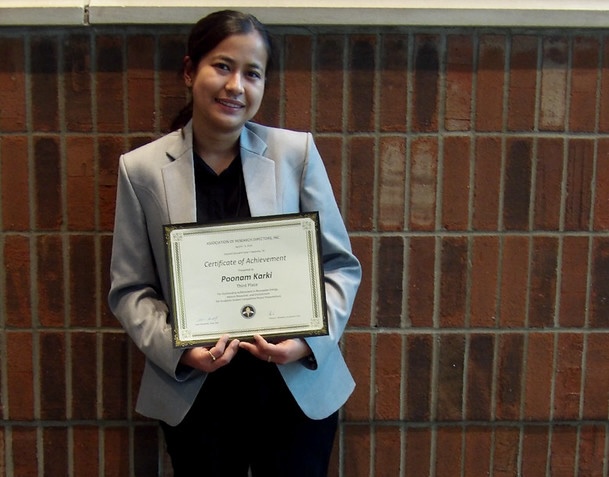Lincoln University Showcases Agricultural Excellence at the 21st ARD Research Symposium
Office of Communications and Marketing
Young Hall
820 Chestnut Street
Jefferson City, MO 65101
 (Left) MyRiah McCabe, Layla White, Abby Sweezer stand with their advisor Kim Cash (right) after the awards ceremony.
(Left) MyRiah McCabe, Layla White, Abby Sweezer stand with their advisor Kim Cash (right) after the awards ceremony.
Lincoln University (LU), a member of the Association of Research Directors (ARD) — comprised of 19 autonomous 1890 land-grant universities — participated in the 21st ARD Research Symposium this spring. The biennial event was held from April 6 to April 9, 2024, at the Gaylord Opryland Hotel in Nashville, Tennessee. More than 1,500 faculty researchers, college administrators, staff, and students from each of the 1890 land-grant HBCUs attended, providing a dynamic forum for students to exchange ideas, collaborate on research projects, and explore significant issues and solutions in science and agriculture.
Continuing its tradition of strong student engagement, 17 undergraduates and 23 graduate students from Lincoln University attended the symposium. Among them, four—Abby Sweezer, Layla White, MyRiah McCabe, and Poonam Karki—were awarded for their outstanding poster presentations. This year’s theme was “Climate, Health and Cultivating the Next Generation of Agriculture Leaders: Creating Solutions in Food, Agriculture and Natural Resources.” Posters were separated by academic level and further divided into five classification areas for judging. Advised by LU’s Kim Cash, Sweezer, White, and McCabe each placed in the top three of their category― Family, Youth, Community, and Economic Development—which had a total of 33 competitors in the undergraduate division. Karki placed third in Renewable Energy, Natural Resources, Environment, and Climate Change, featuring 64 competing graduate students.
"My poster presentation essentially focused on students' interest in future agricultural job opportunities," explained Sweezer, LU sophomore and agriculture education major. Sweezer's research—which earned her first place—investigated the impact of early participation in agriculture-related organizations and exposure to farm life on students' choices to pursue agricultural science careers. The study explored students' educational aspirations and their involvement in youth organizations like 4-H, FFA, and Jr. MANRRS. Results showed that 75% of students interested in agricultural careers had engaged in agriculture from a young age, underscoring the critical role of early educational exposure in shaping the future agriculture workforce.
Layla White, an LU sophomore agriculture major focusing on animal science, secured second place for her research on the impact of Agriculture Literacy Labs in fostering community and engaging students in agricultural education. Initially a single-day event, these labs were extended to an eight-week program at LU featuring activities like harvesting, planting, fishing, and cooking. White's findings indicate that these interactive experiences significantly boost students' sense of acceptance, belonging, and respect—all vital for academic success and deepening connections to their major. White highlighted the value of practical learning in building a supportive educational environment, noting, "A community exists when its members experience a sense of belonging, and the members feel that the group is important to them and that they are important to the group."
MyRiah McCabe, a junior majoring in agriculture education at LU, presented her research about the impact of extracurricular involvement―specifically in Future Farmers of America (FFA)―on students' plans to pursue post-secondary education and agriculture-related degree paths. Conducted at the 2023 State FFA Convention in Columbia, Missouri, a survey for the study showed that 60% of students plan to attend a four-year college degree program. This highlights a strong interest in further education among FFA members. The research also investigated students’ degree preferences and the challenges in filling agricultural sector jobs. McCabe emphasized that understanding the factors that encourage students to pursue higher education and specific career paths can help design targeted educational policies and programs.

In the graduate division's Renewable Energy, Natural Resources, Environment and Climate Change category, LU student Poonam Karki earned third place. Holding a Bachelor of Science in Agriculture, she is also set to graduate this spring with a Master of Science in Sustainable Agriculture. Within her current degree, Karki focuses on soil health and climate-smart conservation practices for organic vegetable production systems in Missouri. Her research, conducted from 2021 to 2023, explored the use of perennial cover crops in these systems, assessing their impact on soil health improvement and biomass production for weed control. This study is critical as it confronts the degradation of soils caused by past traditional farming, which has reduced organic matter and disrupted nutrient cycles. Importantly, Karki's work validates perennial cover crops as a sustainable strategy to boost soil health and suppress weed pressure in farming. With the help of her advisor, Dr. Tunsisa Hurisso, and grant funding from the USDA Organic Transitions Program (OTP), Karki was able to build this study and offer practical solutions to local farmers.
In addition to students, 21 LU staff and faculty members attended the 21st ARD Research Symposium. Many contributed valuable research that supports ARD's mission to address challenges in food and agricultural innovation, particularly focusing on aiding financially underserved communities. This gathering not only showcased the vibrant academic community among the 1890 land-grant HBCUs but also underscored Lincoln University of Missouri's pivotal role in advancing agricultural education and research. Through their active participation and notable achievements, LU students and faculty demonstrated their commitment to leadership and innovation in the agricultural sector—aligning with the symposium’s theme of cultivating the next generation of agricultural leaders.
ARD 1890 institutions include Alabama A&M University, Alcorn State University, Central State University, Delaware State University, Florida A&M University, Fort Valley State University, Kentucky State University, Langston University, Lincoln University in Missouri, North Carolina A&T State University, Prairie View A&M University, South Carolina State University, Southern University and A&M College, Tennessee State University, Tuskegee University, University of Arkansas at Pine Bluff, University of Maryland Eastern Shore, Virginia State University, and West Virginia State University.
